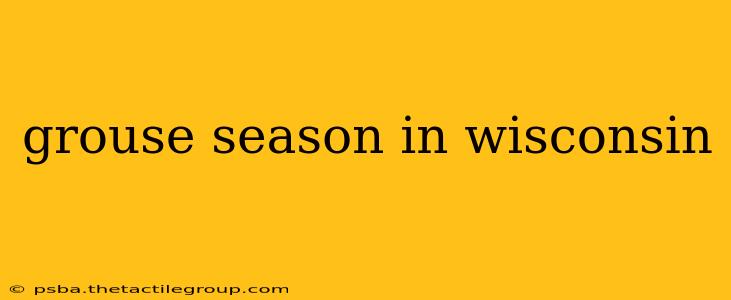Wisconsin's grouse hunting season is a highly anticipated event for many hunters, offering the chance to pursue these challenging and rewarding birds in the state's diverse landscape. This guide will cover everything you need to know about grouse hunting in Wisconsin, from the dates and regulations to hunting strategies and safety tips.
Understanding Wisconsin's Grouse Hunting Seasons
Wisconsin offers hunting seasons for both ruffed grouse and sharp-tailed grouse. These seasons differ in timing and regulations, so it's crucial to consult the official Wisconsin Department of Natural Resources (DNR) website for the most up-to-date information. Never rely solely on this guide; always check the DNR website before heading out to hunt. Regulations can change yearly.
Ruffed Grouse Season
Ruffed grouse are the most commonly hunted grouse in Wisconsin. The season typically runs for several months, usually starting in September and extending into November. Bag limits and other restrictions are subject to change annually, so checking the DNR's website is critical. Specific county regulations may also apply.
Sharp-tailed Grouse Season
Sharp-tailed grouse populations are more localized in Wisconsin. Their hunting season often aligns with or slightly overlaps the ruffed grouse season but is subject to specific regulations and may not be open in all areas of the state. Again, consult the DNR website for exact dates and locations.
Where to Hunt Grouse in Wisconsin
Wisconsin's varied terrain provides excellent grouse hunting opportunities. Ideal habitats include:
- Young Aspen and Birch Forests: These areas offer abundant food and cover for grouse. Look for areas with a mix of trees of varying ages.
- Brushy Edges: The transition zones between forests and fields or wetlands often hold high concentrations of grouse.
- Recently Burned Areas: Regrowth in these areas provides excellent cover and food sources. However, always be aware of fire safety regulations and respect any closures.
Essential Gear and Techniques for Successful Grouse Hunting
Success in grouse hunting requires preparation and skill. Essential gear includes:
- Shotgun: A 12- or 20-gauge shotgun with improved cylinder or modified choke is ideal.
- Ammunition: Use appropriate shot size (typically #6 or #7.5) for grouse.
- Hunting Dog (Optional but Recommended): A well-trained bird dog can significantly increase your success rate. Popular breeds include pointers, setters, and spaniels.
- Appropriate Clothing: Dress in layers to adapt to changing weather conditions. Camouflage clothing is also beneficial.
- Safety Gear: Always wear blaze orange during hunting season to ensure your safety.
Effective grouse hunting techniques include:
- Hunting with a Dog: A well-trained dog will locate and flush grouse, giving you a clear shot.
- Careful Walking and Observation: Move slowly and quietly through the habitat, watching for any signs of grouse activity, such as droppings or movement in the undergrowth.
- Accurate Shot Placement: Grouse are quick and elusive. Aim for a vital area for a clean kill.
- Respecting Private Property: Always obtain permission before hunting on private land.
Safety First: Grouse Hunting Safety Tips
Grouse hunting, like any hunting activity, requires a strong emphasis on safety:
- Always wear blaze orange.
- Be aware of your surroundings and the location of other hunters.
- Never shoot at sounds or shadows.
- Properly identify your target before you shoot.
- Be sure of your shot and what lies beyond.
Beyond the Hunt: Conservation and Responsible Hunting Practices
Supporting the conservation of grouse populations is essential for maintaining this valuable hunting resource. Practicing responsible hunting by adhering to all regulations and ensuring ethical hunting practices helps guarantee the future of grouse hunting in Wisconsin.
This guide provides a general overview of grouse hunting in Wisconsin. For the most accurate and up-to-date information, including specific regulations, season dates, and license requirements, always refer to the official website of the Wisconsin Department of Natural Resources. Happy hunting!

